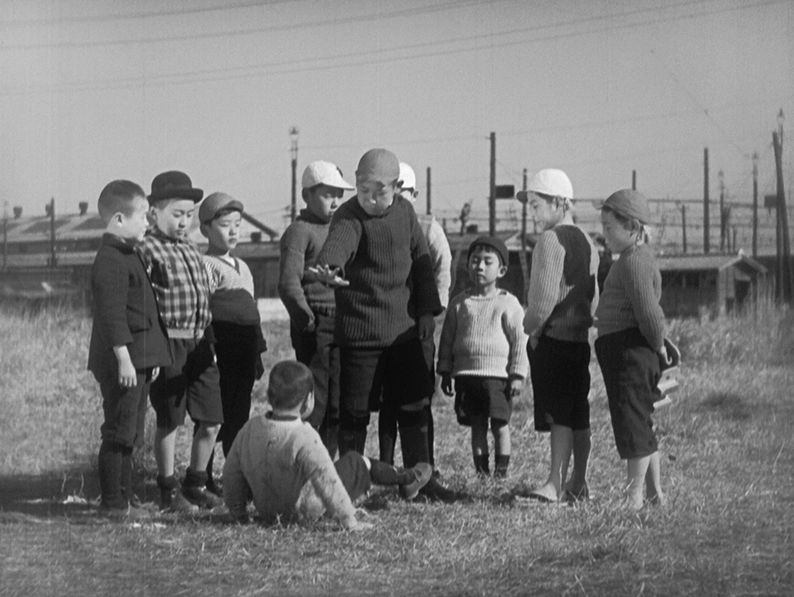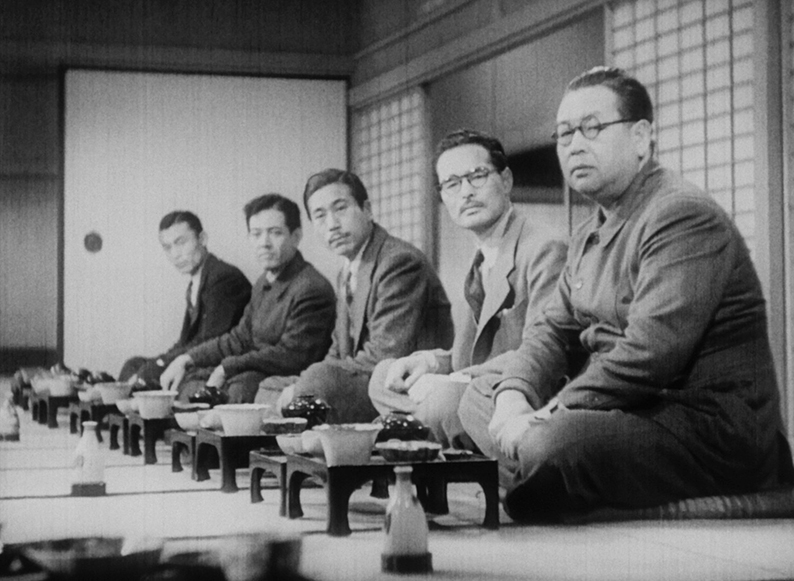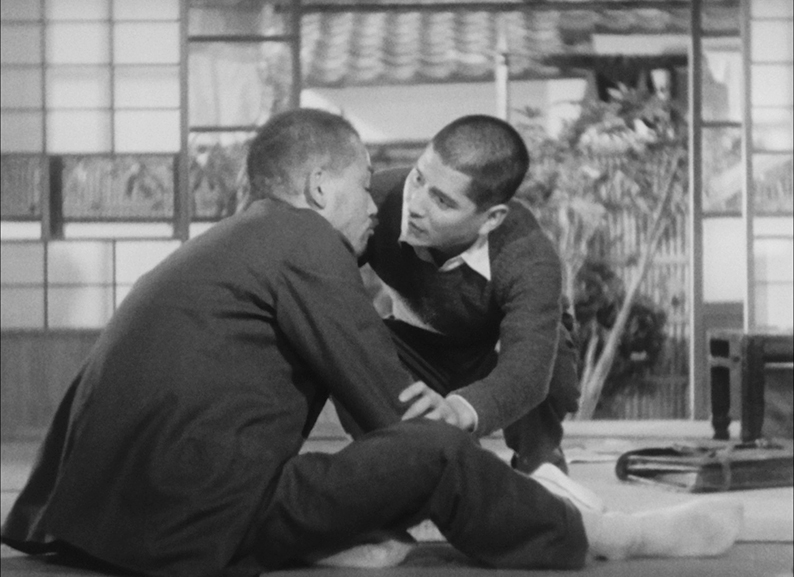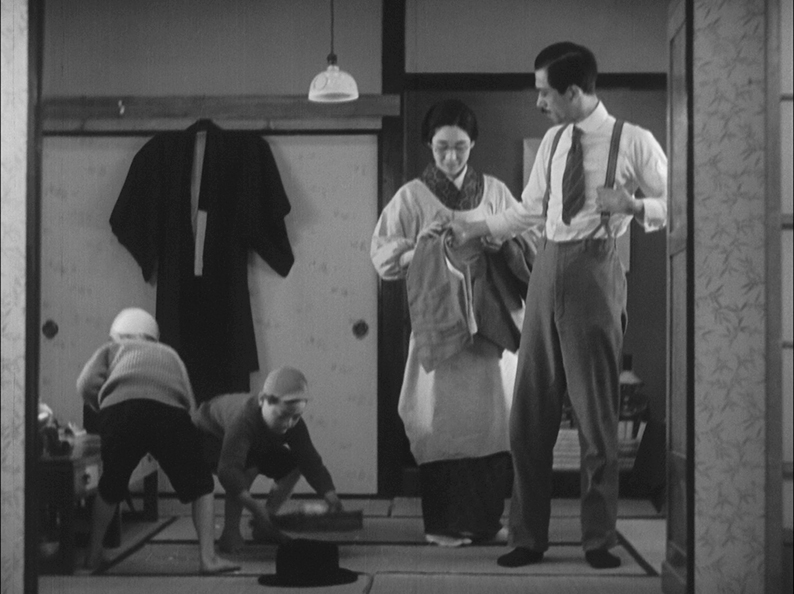|
Last year, the BFI released a three-film, two-disc set, Three films by Yasujirō Ozu, to go with their previous Blu-rays and DVDs of his films. Now on one disc we have two more, one from relatively early in his career, the other made during the War, one silent and one sound. There is certainly scope for more, given availability and state of preservation. Ozu was certainly prolific: in a directing career that lasted from 1927 to 1962 (he died on 12 December 1963, his sixtieth birthday) he made forty-nine features and four shorts. Seventeen of those features (all silents) are lost, while two others only survive in part. So there is plenty to be going on with.
While Kurosawa's films, the showing of Rashomon at the 1951 Venice Festival in particular, opened many western eyes to Japanese cinema, other directors took more time to achieve recognition. Ozu was one of those, his breakthrough being Tokyo Story (Tōkyō monogatari), made in 1953 but not shown in the UK until 1957. It may have been that Ozu's work, though made within his country's commercial film industry, was a more "Japanese" than Kurosawa's more westernised work. With one (lost) exception, his films were all contemporary-set family dramas and comedies, often exploring differences and similarities between generations, and as his style evolved he would return again to the same preoccupations, more than once remaking his own films decades later. That's the case with one of the films in this set.
The number of Ozu's films shown in Britain was still only in single figures at the time of his death. However, now Ozu's position and reputation is secure: he is considered one of the greatest Japanese directors and his influence has been wide.
The Yoshii family has moved to the Tokyo suburbs. The two sons, Ryoichi (Hideo Sugawara) and Keiji (Tomio Aoki, billed here as Kozō Tokkan – he had a career of over seventy years, until his death in 2004) are bullied at school and often play truant. Meanwhile, their father (Tatsuo Saitō) works in an office. If the two boys are to stand up to the bullies, they are critical of what they see as their father's deferring to his boss, and decide to do something about it.
I Was Born, But… (Otona no miru ehon – Umarete wa mita keredo, literally A Picture Book for Grown-Ups – I Was Born, But...), was made for Shochiku in 1932. It was his twenty-fourth film, certainly impressive given that his first had only been in 1927. While the talkies had arrived in Japan in 1930, Ozu wasn't the only director to continue to make silents and did so until 1936 and the now-lost College is a Nice Place (Daigaku yoitoko), thirty-one in all. Part of this was due to the fact that Shochiku's studio at the time was not equipped for sound, so it wasn't necessarily the case that Ozu was, as Chaplin and Murnau were, holding out against the inevitable. Ozu is credited for the original story, under his pseudonym James Maki.

Although this is a family drama, the emphasis is on the two children, Ryoichi and Keiji, and their attempts to understand the behaviour of the adults around them, their father in particular. One characteristic of Ozu's films is his eliding of details others might include. This is a story of two boys and an adult man, and as such there are very few women seen on screen other than Yoshii's wife and the boys' mother (Mitsuko Yoshikawa), and she has a relatively minor role. The group of children is all-male, and Yoshii's working environment is predominantly male too. How much that, especially the latter, is reflective of Japanese society and working life at the time I'm not qualified to say. One thing is clear, though, is how fine a director of children Ozu was, and under his supervision they all give very natural performances. The Japanese subtitle of the film does indicate that the film was not primarily aimed at children, though it would certainly be within their grasp.
This early in Ozu's career, some of the well-known elements of Ozu's style and cinematic language were not all in place. Ozu moves his camera more than he would do later on. There's a particularly showy scene showing Yoshii at work which tracks or dollies along rows of desk and then tracks back. Many of the scenes are shot from the same height as the children, which isn't quite as low down as the "tatami shots" (shots at the level of someone sitting on a tatami or floor mat) which are prevalent in his later work.
I Was Born, But… isn't connected to the similarly titled in English I Graduated, But… (Daigaku wa deta keredo, 1929, ten minutes survive) and I Flunked, But… (Rakudai wa shitakeredo, 1930, exists). It remains one of his most highly-regarded of his films in general and his silent films in particular. Ozu did loosely remake his film with sound and in colour late in his career with Good Morning (Ohayō, 1959), though in that case the children's protest is no longer not to eat but not to speak.
Shuhei Horikawa (Chishū Ryū) is a middle school maths teacher bringing up his son Ryohei (Haruhiko Tsuda as a child, Shūji Sano as an adult). When a pupil dies in a boating accident on a school trip, Shuhei in remorse leaves the profession. He takes an office job in Tokyo and devotes himself to his son's education...
There Was a Father (Chichi Ariki) is another male story, this time one of a father and son. Again there are few women to be seen, not even a mother this time as Shuhei is a widower. The story is one of how the two men of different generations come to understand and relate to each other, with Ryohei seeing the few days that he and his father spent together (sharing a bath, fishing) being the happiest of his life. Shuhei is a man who defines himself by his work: he cannot continue as a teacher as he feels he failed in his duty, though he had nothing to do with the boy's tragic death. Despite his friend and colleague Hirata (Takeshi Sakamoto) trying to persuade him to return – he was a good teacher and popular with his charges – he is insistent that he cannot. Even when he is ill, he insists on going to work, pointing out that he has never missed a day in his life.

Ozu's style and techniques were well established at this point. By now, the camera rarely if ever moves (I didn't spot any example in this film) so there are no more tracking shots like the ones in I Was Born, But… Early on in his career, Ozu occasionally dissolved or faded to black between scenes, but now each transition is a hard cut, often starting the new scene on an inanimate object, a "pillow shot" as it came to be called. He would often elide setting or story elements that other directors might have included. One such cut jumps us forward several years, and all of a sudden it's the present day, Japan is at war, and Ryohei is now twenty-five. Ozu typically stages dialogue scenes by having speakers talking to camera or close to it. And in tandem with that static camera, there are the favoured "tatami shots". This style does lean the film towards minimalism, and many of the key moments are understated. See, for example, how Ozu conveys a character's grief by shooting him from behind, with just a small movement of his shoulders indicating his anguish. Another recurring element in Ozu's work is the presence of Chishū Ryū, who appeared in all but two of Ozu's films (I Was Born, But… was one of the exceptions) and here played his first lead role for the director. Ozu devotee Paul Schrader paid tribute by casting Ryū in his own film Mishima: A Life in Four Chapters (1985).
The film was made in 1942, though Ozu had written the first draft of the screenplay five years earlier. He had been unable to make the film then as he was drafted into the Japanese Army and posted to China, causing a four-year hiatus in his career. When it was eventually made, Japanese films were required to express a nationalistic agenda in wartime. However, with the end of the War and the American occupation of the country, this material was no longer acceptable. So seven minutes were cut, largely removing patriotic poetry and song and references to the war and to Ryohei's army service. For decades this version was the only one
available, with copies not in good condition and the negative being lost. Only a 16mm duplicating negative of this 35mm-shot film survived. However, in the 1990s Gosfilmofond, the Russian state archive, found an incomplete 35mm print which turned out to be most of an original release print with the censored scenes included. So some five minutes were able to be restored and that is the version on this disc.
The BFI's release of Two Films by Yasujirō Ozu is a single Blu-ray disc encoded for Region B only. Both films on the disc carry U certificates.
The transfers on this disc distinguish between the silent ratio of 1.33:1 for I Was Born, But… and the Academy Ratio of 1.37:1 (standardised in Hollywood in 1932) for There Was a Father. Both films were restored by Shochiku and the National Film Archive of Japan. I Was Born, But... was restored in 4K resolution from a 35mm print held by the Harvard Film Archive and a 16mm duplicating negative. This film is by some way the best-looking of the two on this disc, though greyscale is more limited than other films of this era and contrast is flatter. Grain looks natural, though.
Silent speed before the sound era varied, sometimes sixteen or eighteen frames per second (fps) and often in the 1920s 20 fps when motorised cameras became the norm instead of the earlier handcranked ones. To render these at talkie speed (24 fps) for Blu-ray, a number of frames would be duplicated per second so that we watch the film at its intended speed. The transfer of I Was Born, But… plays at sound speed (actually 23.976215 fps) and there are no duplicated frames, indicating that the film was actually shot at sound speed although it was silent. This would make sense, given that the cinemas which would show this silent film might well be showing talkies at other times, and this would avoid having to change the projector speed from one show to the next. I Was Born, But… certainly seems to be playing correctly, with only a few scenes seeming speeded up a little, possibly intentionally. One such is Yoshii spanking Ryoichi late on.

There Was a Father was restored in 4K resolution from a Russian-held 35mm print and again a 16mm duplicating negative from Shochiku. The original materials were clearly in a rough state, and the 16mm origins of much of it results in noticeable softness. There is also quite a bit of print damage, with heavy rainfall scratches often at points where you'd expect them, the beginnings and ends of reels. However, it's clear that this is the best the film is ever likely to look, this far from its original release.
I Was Born, But… has a music score from Ed Hughes, performed by the New Music Players, rendered in LPCM 1.0. There Was a Father has two soundtrack options, both in LPCM 1.0, one restored and one not. There's not a great deal of difference between the two, the main one being the amount of hiss and crackle present on both, suggesting that the track has seen as many better days as the visuals.
Both films have restoration credits at the start and I Was Born, But… also lists at the end the musicians performing the score. English subtitles are optionally available for translating the Japanese intertitles of the former and the dialogue of the latter.
Audio commentaries by Adrian Martin
Adrian Martin contributed a commentary on A Hen in the Wind on the previous BFI box set, and here he does the duties on both films on this disc. He begins I Was Born, But… by saying that he doesn't like to begin a commentary by saying that a film is a masterpiece and you must love it, because he is aware that people have to see a film for the first time and need a little space to come to that conclusion. However, this film is, he says, absolutely wonderful. With both films, there's not a great amount of scene-specific commentary but more a discussion of Ozu's themes and techniques and draws heavily on pre-existing books on Ozu from both Japanese and non-Japanese commentators such as Shigehiko Hasumi and the recently-deceased David Bordwell.
Regarding I Was Born, But… he says that he often prefers to watch the film silently, and praises the Ed Hughes score on this disc, but does talk about a theatrical screening with a very mismatched music score that was particularly bad, introduced by its conductor pretentiously talking about having studied Zen aesthetics before composing the score. This experience is left nameless and dateless by Martin which is probably for the best. With There Was a Father (the commentary he recorded first of the two), there is much of the same discussion of themes and style, with reference to prominent Ozu scholars. He also talks about the post-War censorship of the film and its present reconstruction almost to its original form.
Booklet
The BFI's booklet, available with the first pressing of the disc, runs to twenty pages. There is a spoiler warning for the films. As Adrian Martin does the commentary duties, booklet detail this time is Bryony Dixon for I Was Born, But… and Tony Rayns for There Was a Father.

Dixon leads off by saying that Ozu's work is one of the most charming silent films ever made, though she ends by suggesting that Ozu was straining at the limits of silents and might have made it as a talkie if he'd been able to. This essay is briefer than many, but does cover all the bases of the film's style and themes and place in Ozu's career. Rayns spends more time on the film's making during wartime and cutting after the War, detailing the patriotic impulses that Ozu had to take account of, whether or not he shared them, and which the Occupation censors objected to. He points out that while there are other father/son films in Ozu's filmography but this is the only one where it turns out father knows best. Rayns is the only contributor to the disc or the booklet to render Japanese names in the local style of surname first, for example Ozu Yasujirō.
As well as credits for both films, the booklet also contains a piece by Ed Hughes on his score for I Was Born, But… He paid attention to the film's rhythms, finding by trial and error a particular tempo which fitted the action on screen. Similarly, Ozu's minimalism dictated a smaller range of instruments: flutes (Rowland Sutherland), clarinet (Fiona Cross), piano (Richard Casey), violin (Susanne Stanzeleit), cello (Oliver Coates) and percussion (Tim Palmer). Hughes subdivided the film into twenty-two scenes and composed a short piece for each. Themes and motifs recur, often in different patterns. Musicians should find this fascinating, though it's a little too technical for non-musicians.
When I reviewed the BFI's Three Films set, six months ago as I write this, I said that Ozu's body of work was large and cohesive enough to support several releases. So here we are with another set, with two deeper cuts from Ozu's filmography. Given the circumstances of There Was a Father in particular, the two films here are presented as well as they can be. Let's hope there are more releases to come.
|